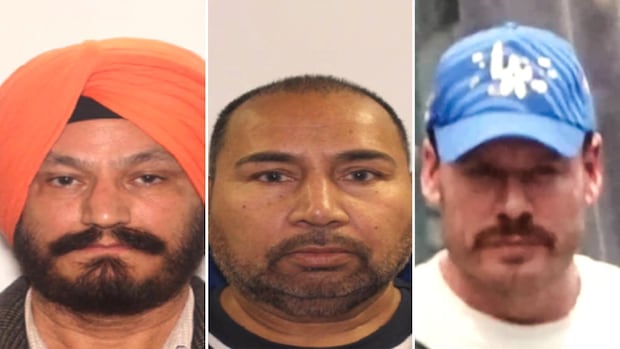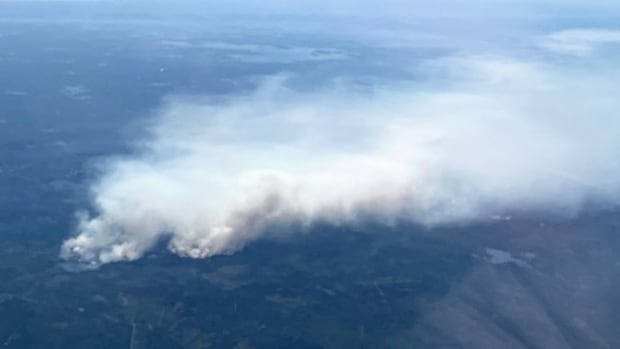Robert Apgar-Taylor vividly remembers the day he and his husband, Robert Taylor, crossed the border into Canada, fleeing the changing political climate in their native United States in hopes of a safer life in Canada.
“We took a picture at the border. It was winter,” said Apgar-Taylor. “We wore our plaid shirts and hats, and showed our immigration papers with the moving truck behind us. We were so excited.”
To avoid confusion, this story refers to Apgar-Taylor’s husband as Rob.
The couple made their move to Canada in December 2022.
Apgar-Taylor, a former reverend at the United Church of Christ, had just been appointed to a United Church of Canada parish in London, Ont.
“When Trump was first elected [in 2016], we thought about leaving, but we thought we were overreacting and things couldn’t get that bad,” he said. “But things turned out to be just as bad as we imagined.”
Since Trump began his first term in 2017, the couple watched with anguish and became increasingly uncomfortable with the changing political climate in their country.
First, there was the removal of a page dedicated to the 2SLGBTQ+ community from the White House website, just hours after Trump’s inauguration in 2017.
In 2020, there was the violent repression of anti-racism protesters with rubber bullets and tear gas outside the president’s residence. The attack on the U.S. Capitol came a year later.
“I couldn’t believe that the Constitution and the safeguards of civil society were being dismantled and that people were blindly following [Donald Trump],” recalls Rob, a Washington, D.C., police officer at the time.
As an openly gay pastor, Apgar-Taylor said he received a death threat while working in Maryland.
But the final blow for the couple came in 2022, when the U.S. Supreme Court struck down Roe v. Wade, which guaranteed the right to abortion nationwide.
“Fifteen seconds after hearing the news, Rob looked at me and said, ‘That’s enough. We have to go,'” Apgar-Taylor recalled.
Dozens of requests about resettling
The two aren’t the only ones who’ve looked to move to Canada since Trump’s arrival in politics.
In the two weeks following Trump’s re-election in November, the couple received about 30 messages from Americans asking how to settle north of the border.
The United Church of Canada, for its part, reports it has been contacted by about 20 American clergy members interested in obtaining positions in Canada since January. Previously, it received only three to five such requests annually.

A few kilometres from the parish where Apgar-Taylor now works, another American oversees Sunday service: Rev. Joshua Lawrence at First-St. Andrew’s United Church, also in London.
The civil rights activist from Texas moved to the southwestern Ontario city with his wife, Amariee Collins — who is of African American descent — and their young son four years ago. They made the move to escape what the pastor sees as an increase in racism and intolerance since the rise of the Trump-popularized Make America Great Again (MAGA) movement.
“There have been acts of violence,” Lawrence said. “Black churches have been burned in the South. The issues of slavery, the emergence of the Ku Klux Klan … white terrorism. All of these things have begun to resurface in other forms.”
The reverend, who believed he was ministering in a progressive parish, quickly saw new tensions surface within his own congregation.
He said he received an email suggesting that his wife leave the parish. Then, he was shown the door because his values were deemed too liberal.
He added that in his former parish, openly displaying his support for the 2SLGBTQ+ community and the fight against racism, as he does now in Canada, would have been risky.
“I often wondered if I could do it without risking threats or the church being attacked,” he lamented.
Because the open carrying of firearms in public places such as churches can be done legally in Texas, Lawrence became worried about the potential for violence.
“We packed our things and left, perhaps faster than necessary, but we were scared and didn’t know what might happen.”
Becoming Canadian not so simple
While Apgar-Taylor and Lawrence are now enjoying their new Canadian refuge with their families, the challenge of obtaining Canadian permanent residency is far from over.
Both men have work visas linked to the United Church of Canada. They expected to obtain permanent residency after six months to two years in Canada, but Ottawa’s recent lowering of permanent immigration thresholds thwarted their plans.
For example, Apgar-Taylor and Rob still haven’t been able to become homeowners because until they obtain permanent residency, they will have to pay a 25 per cent foreign buyers’ tax in Ontario.
The situation forced Apgar-Taylor to postpone his prostate cancer surgery for three months, when the couple had to urgently move out of their rented apartment.
“I couldn’t have surgery and move at the same time,” he said. “I was devastated.”
As for his husband, he had to give up his career in law enforcement and now works nights in a warehouse.
Lawrence and his wife are often forced to live far apart since the trained midwife and ultrasound technician still hasn’t been able to get the qualifications to work in her field in Ontario.
She spends several weeks a month in the United States so she can earn a living.
“There were times when we wondered if we had made the right decision,” said Lawrence.
In an emailed statement, Immigration, Refugees and Citizenship Canada stated that immigration processing times “depend on various factors, including immigration targets, file complexity, security checks and the timeliness of applicants responding to requests for information.”
‘The door is closed’

Immigration lawyer Greg Willoughby has heard similar stories from U.S.-born clients who face barriers trying to immigrate to Canada.
From his small office in downtown London, he regularly gets calls from Americans, including parents of transgender children, who seek to escape the U.S. administration’s policies.
“When Trump was first elected, I received calls from people asking if there were specific immigration options for Americans, and the answer is ‘no,'” said Willoughby.
He pointed out that Americans must qualify through a points system set up by Ottawa to assess them as potential immigration candidates.
“If you’re not a young person in your 20s or 30s with a degree from a Canadian college or university and a few years of work experience in Canada, you won’t be able to get enough points.”
He noted a growing number of Americans are turning to humanitarian and compassionate applications, though their chances of success are slim.
“It’s not the Vietnam War anymore, and we no longer welcome draft dodgers. It’s the same for transgender people. The door is closed.”
‘A recovering American’

Despite the obstacles, Apgar-Taylor, Rob and Lawrence remain hopeful of their future in Canada.
“My name is Rob, and I’m a recovering American,” is how Apgar-Taylor sometimes likes to open his sermons.
In the basement of their home, the reverend and his husband contemplate the photos of their children and grandchildren in a family tree painted on the wall.
“We miss them every day,” said Robert.
Both feel that returning to the United States is not an option for them.

The year Apgar-Taylor and Rob moved to London, two of their friends were assaulted back home in separate attacks because of their sexual and gender identities.
“You don’t realize how much you’re holding your breath until you don’t have to hold it anymore. That’s how it feels to be in Canada,” said Apgar-Taylor.






